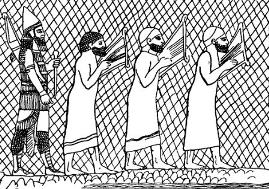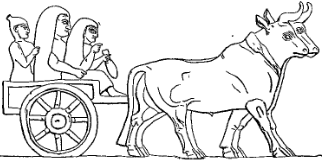INFO
Hammurabi Game
Templates to use in yor Power Points about Mesopotamia
resources
Hammurabi Code
DAILY LIFE
With the start of the Sumerian civilization, daily life in Mesopotamia began to change. Prior to the growth of cities and large towns, people lived in small villages and most people hunted and gathered. There wasn't a lot of variety in jobs or daily life.

Assyrian Musicians
With the growth of large cities, things changed. There were all sorts of jobs and activities. While many people still worked as farmers in the country, in the city a person could grow up to work in a number of different jobs such as priest, scribe, merchant, craftsman, soldier, civil servant, or laborer.
Different Classes of People
With people moving to towns and governments being formed, society was dividing into different classes of people for perhaps the first time. At the top of society was the king and his family. The priests were considered near the top as well. The rest of the upper class was made up of the wealthy such as high level administrators and scribes.
Below the upper class was a small middle class made up of craftsman, merchants, and civil servants. They could make a decent living and could work hard to try and move up in class.
The lower class was made up of laborers and farmers. These people lived a harder life, but could still work their way up with hard work.
At the bottom were the slaves. Slaves were owned by the king or bought and sold among the upper class. Slaves were usually people who were captured in battle.

Workers and merchants traveling
What type of homes did they live in?
Most people lived in mud brick homes. They were rectangular in shape and had two to three levels. The roofs were flat and people would often sleep on the roofs during the hot summers. The mud brick worked as a good insulator and helped to keep the homes a bit cooler in the summer and warmer in the winter.
Entertainment
As the cities of Mesopotamia grew wealthy, there were more resources and free time for people to enjoy entertainment. They enjoyed music at festivals including drums, lyres, flutes, and harps. They also enjoyed sports such as boxing and wrestling as well as board games and games of chance using dice. The children of the time would have had toys to play with such as tops and jump ropes.
Art and poetry was a big part of the wealthier cities. Most of the poetry and art had a religious theme or honored the king of the city. Storytellers would have passed stories down over generations with some of the more popular stories eventually being written down on clay tablets by scribes.
Clothing
Clothing was typically made from sheepskin or wool. The men wore kilt-like skirts and the women wore longer dresses. They enjoyed wearing jewelry, especially rings. The women braided their long hair, while the men had long hair and beards. Both men and women wore makeup.
QUIZ ABOUT MESOPOTAMIA
Hammurabi Game
Templates to use in yor Power Points about Mesopotamia
resources
Hammurabi Code
DAILY LIFE
With the start of the Sumerian civilization, daily life in Mesopotamia began to change. Prior to the growth of cities and large towns, people lived in small villages and most people hunted and gathered. There wasn't a lot of variety in jobs or daily life.

Assyrian Musicians
With the growth of large cities, things changed. There were all sorts of jobs and activities. While many people still worked as farmers in the country, in the city a person could grow up to work in a number of different jobs such as priest, scribe, merchant, craftsman, soldier, civil servant, or laborer.
Different Classes of People
With people moving to towns and governments being formed, society was dividing into different classes of people for perhaps the first time. At the top of society was the king and his family. The priests were considered near the top as well. The rest of the upper class was made up of the wealthy such as high level administrators and scribes.
Below the upper class was a small middle class made up of craftsman, merchants, and civil servants. They could make a decent living and could work hard to try and move up in class.
The lower class was made up of laborers and farmers. These people lived a harder life, but could still work their way up with hard work.
At the bottom were the slaves. Slaves were owned by the king or bought and sold among the upper class. Slaves were usually people who were captured in battle.

Workers and merchants traveling
What type of homes did they live in?
Most people lived in mud brick homes. They were rectangular in shape and had two to three levels. The roofs were flat and people would often sleep on the roofs during the hot summers. The mud brick worked as a good insulator and helped to keep the homes a bit cooler in the summer and warmer in the winter.
Entertainment
As the cities of Mesopotamia grew wealthy, there were more resources and free time for people to enjoy entertainment. They enjoyed music at festivals including drums, lyres, flutes, and harps. They also enjoyed sports such as boxing and wrestling as well as board games and games of chance using dice. The children of the time would have had toys to play with such as tops and jump ropes.
Art and poetry was a big part of the wealthier cities. Most of the poetry and art had a religious theme or honored the king of the city. Storytellers would have passed stories down over generations with some of the more popular stories eventually being written down on clay tablets by scribes.
Clothing
Clothing was typically made from sheepskin or wool. The men wore kilt-like skirts and the women wore longer dresses. They enjoyed wearing jewelry, especially rings. The women braided their long hair, while the men had long hair and beards. Both men and women wore makeup.
QUIZ ABOUT MESOPOTAMIA